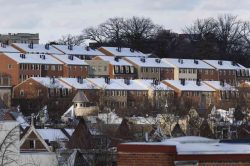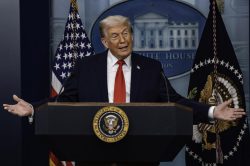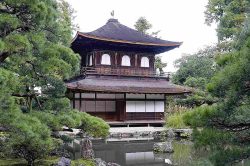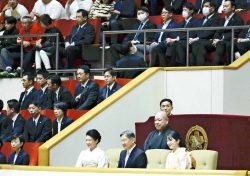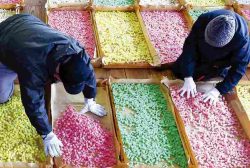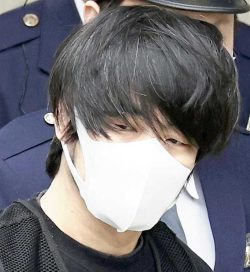
Commerce Secretary Gina Raimondo at a Senate hearing in 2023.
17:29 JST, December 8, 2024
SIMI VALLEY, Calif. – President-elect Donald Trump’s suggestion of implementing high tariffs on semiconductor imports to replace the current U.S. policy of giving federal grants to domestic chipmakers is a “horrific idea” that would endanger national security, outgoing Commerce Secretary Gina Raimondo said Saturday.
Issuing billions in federal grants to build up domestic chip production is crucial to ensuring the U.S. military and economy doesn’t depend on chips made outside of the United States, Raimondo said Saturday at the Reagan National Defense Forum, a gathering of leaders from Congress, the military and the defense industry.
The Chips and Science Act, passed in 2022, set aside $52 billion in taxpayer money to be distributed as grants for new commercial chip factories and semiconductor research institutes.
Raimondo, who is set to leave her job when Trump takes over the White House, was responding to a question about Trump’s comments on a podcast before the election criticizing the Chips and Science Act and calling for high tariffs on imported chips to force companies to move production to the United States.
“It’s a horrific idea, it’s a reckless idea,” Raimondo said.
She said she hoped Trump’s comments are simply campaign rhetoric that he won’t implement. “If we’re in a place in this country where we can’t agree on national security and protecting the people of this country, then that’s a very dark place,” Raimondo said.
The Trump transition team on Saturday characterized tariffs as a way to bolster U.S. companies.
“President Trump has promised tariff policies that protect the American manufacturers and working men and women from the unfair practices of foreign companies and foreign markets,” said Brian Hughes, a spokesman for Trump’s team.
Raimondo has led some of the Biden administration’s most aggressive efforts to slow China’s technological advancement while also beefing up U.S. capacity to produce technology at home. Most high-end computer chips are made in Taiwan, which China claims as part of its territory.
Some computer chip company executives have said the federal grant program that Raimondo oversees has been too slow in distributing money. Over the last few weeks, her agency has made a flurry of announcements as the Biden administration tries to allocate as much of the money as possible before it leaves office.
Most of the money would be allocated by the end of the year, Raimondo said Saturday.
The Commerce Department last month finalized nearly $11 billion in grants and contracts to U.S. chipmaker Intel, the largest distribution to any company. A week later, the company’s CEO Pat Gelsinger, a key supporter of the Chips and Science Act, resigned amid the company’s ongoing difficulties that have led to layoffs and other restructuring moves.
“There’s no secret, Intel has struggled,” Raimondo said at the forum. “But Intel is an important American company, and we need them to succeed.”
The U.S. government has issued Chips and Science Act grants to several other companies, including $6.6 billion for the Arizona subsidiary of the world’s leading contract manufacturer of chips, Taiwan Semiconductor Manufacturing Co.
“We have a portfolio,” Raimondo said.
Top Articles in News Services
-

Prudential Life Expected to Face Inspection over Fraud
-

South Korea Prosecutor Seeks Death Penalty for Ex-President Yoon over Martial Law (Update)
-

Trump Names Former Federal Reserve Governor Warsh as the Next Fed Chair, Replacing Powell
-

Suzuki Overtakes Nissan as Japan’s Third‑Largest Automaker in 2025
-

Japan’s Nikkei Stock Average Alls from Record as Tech Shares Retreat; Topix Rises (UPDATE 1)
JN ACCESS RANKING
-

Univ. in Japan, Tokyo-Based Startup to Develop Satellite for Disaster Prevention Measures, Bears
-

JAL, ANA Cancel Flights During 3-day Holiday Weekend due to Blizzard
-

Japan Institute to Use Domestic Commercial Optical Lattice Clock to Set Japan Standard Time
-

China Eyes Rare Earth Foothold in Malaysia to Maintain Dominance, Counter Japan, U.S.
-

Japan, Qatar Ministers Agree on Need for Stable Energy Supplies; Motegi, Qatari Prime Minister Al-Thani Affirm Commitment to Cooperation


